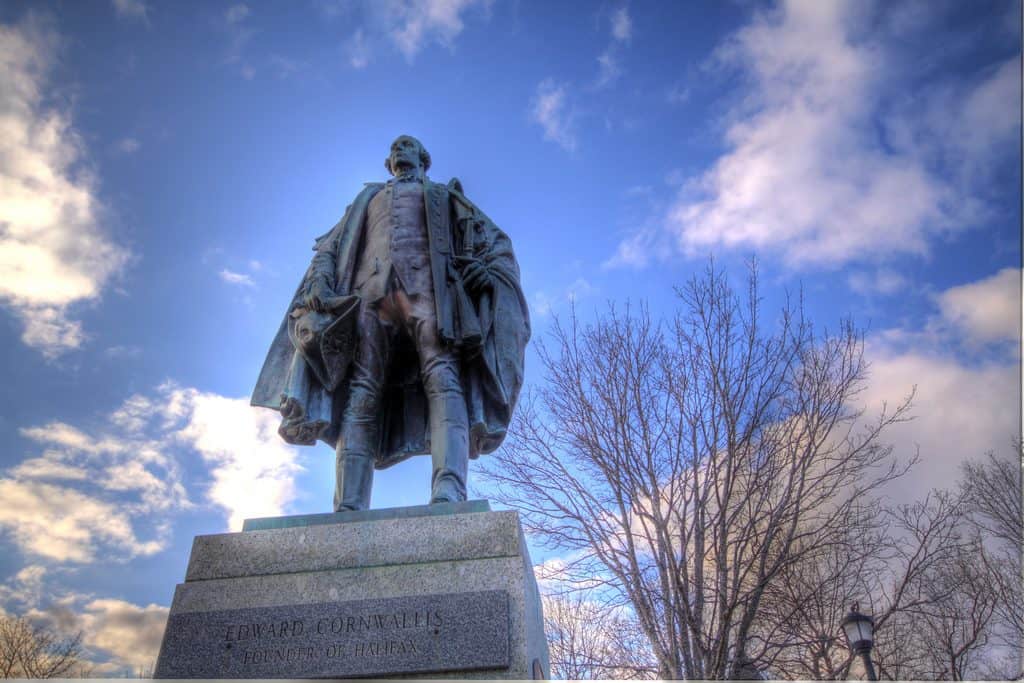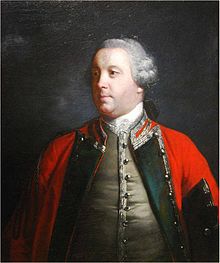
(Flickr)
Between playing a key role in putting down the Jacobite uprising at the Battle of Culloden in 1746 and being named Governor of Gibraltar in 1761, British Lieutenant General Edward Cornwallis served a three-year stint as the first Governor of Nova Scotia and, in the process, became the de-facto founder of Halifax, my hometown.
For most of the past 250 years, we’ve unquestioningly celebrated Cornwallis’ colony-settling, city-making legacy.
Stuff got named after him: CFB Cornwallis, the former military base, CCGS Edward Cornwallis, a coast guard vessel, a river, a street, even a park in the south end of Halifax, complete with a statue of a forward-facing Cornwallis described as boasting “a virile, strong, stand-fast face… usually to be found in the faces of all men who achieve.”
Oh, yes, and there was a Cornwallis Junior High School too. It was recently renamed Halifax Central Junior High.
Therein lies the tale.
Some suggest Cornwallis was never statue-worthy. According to author-journalist Jon Tattrie’s book, Cornwallis: The Violent Birth of Halifax, his role at Culloden went beyond anything that would — even then — be considered acceptable military tactics. He directed his men to pursue fleeing Highlanders, murder them, rape their women, kill their children and destroy their homes.

Edward Cornwallis
His record in Nova Scotia — where his part in the founding of the city was more Board of Trade functionary than swashbuckling explorer-discoverer — was as bad, if not worse. According to aboriginal historian Daniel Paul, who has waged a lengthy campaign to un-venerate our founding father, Cornwallis was responsible for genocide against the Mi’kmaq as a result of a 1749 scalping proclamation, offering 10 guineas for every Mi’kmaq “taken or killed, to be paid upon producing such savage taken, or his scalp.”
Which helps explains why Cornwallis Junior High is now Halifax Central.
As the aboriginal member of the city’s school board put it at the time, his name should be “deeply offensive to [anyone] who believes school names should recognize persons whose contributions to society are unblemished by acts repugnant to the values we wish our schools to embody and represent.”
Therein lies the rub.
Should we judge yesterday’s heroes by today’s standards, or by the times in which they lived?
Can someone’s singular accomplishment — settling a city, for example — ever override the less praiseworthy reality of their other actions?
It’s not just a Cornwallis question. Or a right-left issue.
Consider the late Tommy Douglas. He’s revered today as the founder of Medicare, and was selected Greatest Canadian in a 2004 CBC competition. But as a young man, Douglas supported eugenics, an abhorrent social movement that promoted sterilization of the feeble and mentally handicapped to improve the gene pool.
Nellie McClung — a clearly iconic Canadian suffragette leader recently championed as a female face of honour on Canada’s bank notes — also supported eugenics.
Clara Brett Martin, Canada’s first female lawyer, was an anti-Semite. So was Roald Dahl, the hugely successful British author whose darkly humorous children’s tales are still a bedtime staple in many homes.
Should we stop reading him?
These are questions without easy answers. But people are now openly debating what history means and why it matters — from the University of Texas (where student leaders have called for removing statues of four leaders of the disgraced American Confederacy), to the University of Cape Town (where a #RhodesMustFall movement wants to rid the world of images glorifying Cecil Rhodes, he of the famous Rhodes scholarships but also an infamous litany of bombastic, imperialist and racist pronouncements). But not in Halifax.
Early in May, councillors narrowly voted down a proposed open debate on whether we should continue to celebrate Cornwallis’ memory.
Argued Councillor David Hensbee, one of those opposed to the discussion “He is the founder of this municipality. We can’t escape that.”
But do we need to celebrate it? Councillor Waye Mason, who brought forward the motion, says such a debate is “inevitable. We just haven’t decided to have it at this point.”
A pity.
***
Originally published in Atlantic Business Magazine, July-August 2016



 STEPHEN KIMBER, a Professor of Journalism at the University of King's College in Halifax and co-founder of its MFA in Creative Nonfiction Program, is an award-winning writer, editor and broadcaster. He is the author of two novels and eight non-fiction books. Buy his books
STEPHEN KIMBER, a Professor of Journalism at the University of King's College in Halifax and co-founder of its MFA in Creative Nonfiction Program, is an award-winning writer, editor and broadcaster. He is the author of two novels and eight non-fiction books. Buy his books
I am of the opinion that we cannot and should not try to change history, good or bad, by ignoring it. These things all happened, good or bad, and it is history!!! We have had wars over the years where many were slaughtered and killed, do we pretend it never happened, of course not! Leave history alone and get on with trying to build a better future from the lessons we have learned from our past. I am sure that many of the people from our history, whom we celebrate, have done plenty of the “not so nice stuff” as well as some good. Tell the stories of both and let life go on, making new history for the people of the future. Just my opinion.
Can we not maybe change the narrative on the plaque and tell the whole story and just tell the facts of history without any glorification?
Teach about his terrible deeds and great shortcomings as well.
I agree completely. We should not cover up history just ensure we tell the whole story. However I don’t think think that extends to naming schools, streets and whatever after clearly unsavoury characters like Cornwallis.l